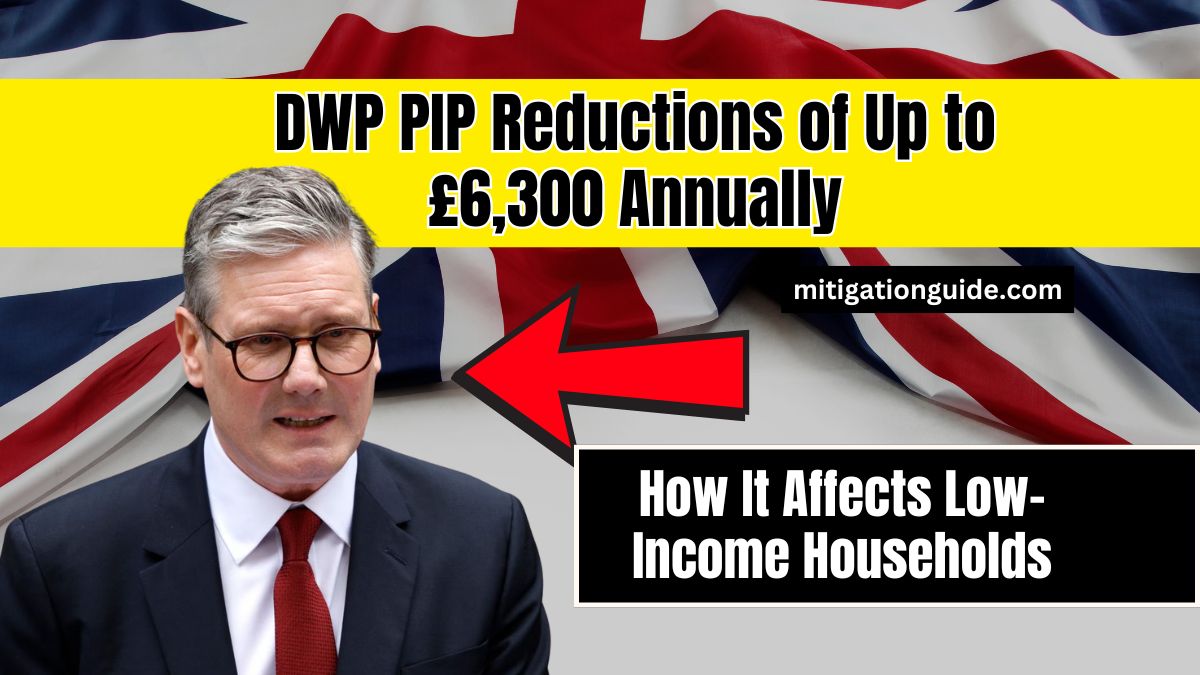The Department for Work and Pensions (DWP) has proposed PIP (Personal Independence Payment) cuts of up to £6,300 annually, causing growing concern, especially for low-income households and individuals living with disabilities.
These proposed changes, aiming to save around £5 billion by 2029-30, could have significant financial consequences for millions of people, deepening the risk of poverty and hardship for vulnerable groups.
Here’s an in-depth breakdown of what the proposed DWP PIP cuts could mean for claimants, who is most at risk, and what you can do to prepare.
Key Facts about DWP PIP Cuts
| Aspect | Details |
|---|---|
| Topic | DWP PIP cuts of up to £6,300 per year |
| Affected Households | Over 1.2 million claimants could lose eligibility |
| Annual Financial Impact | Reduction of £4,200 to £6,300 per year for some |
| Poverty Risk | 250,000 individuals, including 50,000 children, may face increased poverty |
| Reform Goal | Save £5 billion annually by 2029-30 |
| Target Audience | Disabled individuals and low-income households |
| Official Source | https://www.gov.uk/pipVisit GOV.UK PIP Page |
The potential DWP PIP cuts are alarming for disabled individuals and low-income households. Though these cuts are intended to streamline the system, the human cost may be significant. If you are currently receiving PIP, it’s crucial to stay informed, prepare for changes, and seek support.
What Is PIP and Why Is It Changing?
PIP is a benefit offered by the DWP to help those with long-term health conditions or disabilities cover additional living costs. This includes mobility support and assistance with personal care needs.
The government argues that PIP reforms are necessary because the current system is deemed “unsustainable”.
The proposed changes might introduce stricter eligibility criteria, reduce benefit awards, or even replace the payments with alternative forms of support such as one-time grants or vouchers.
How the Cuts Could Impact You
- Up to £6,300 Loss Annually If you currently receive the full PIP rate, you could face a £60 to £120 weekly loss, which could total up to £6,300 annually, depending on how your eligibility is assessed under the new system.
- Increased Poverty Risks According to the UK government’s impact assessment, as many as 250,000 people, including 50,000 children, could be pushed into relative poverty if these cuts go through.
- Increased Reliance on Charities Charities like Scope and Disability Rights UK warn that cuts will push more individuals to rely on food banks and third-party donations to meet basic needs.
- Mental Health Strain Reduced financial security could worsen mental health issues for individuals already dealing with chronic conditions, leading to increased anxiety, stress, and depression.
Why Are These Cuts Being Proposed?
The government argues that PIP reform is necessary to ensure that support is targeted only at those who genuinely need it, while encouraging individuals with manageable conditions to seek employment.
According to Mel Stride, the Work and Pensions Secretary, the goal is to shift the focus from cash payments to tailored support like therapy, assistive devices, or job coaching.
However, this approach has faced significant backlash from disability advocates. Critics argue that the reforms prioritize short-term financial savings over the long-term well-being of vulnerable citizens.
The Resolution Foundation has also voiced concerns that the changes could be seen as cost-cutting disguised as reform.
Who Is Most Likely to Be Affected?
- People with Mental Health Conditions Many PIP claimants suffer from invisible conditions such as PTSD, depression, or anxiety. Under the proposed changes, these conditions may be deprioritized, making it more difficult to qualify for PIP.
- Individuals with Fluctuating Conditions Those with conditions like Multiple Sclerosis, Fibromyalgia, or ME/CFS may struggle to meet the new assessment criteria if their symptoms are not consistently severe.
- Young Disabled Adults Young adults, particularly those aged 18-30, are a growing segment of PIP recipients. Losing access to PIP could negatively affect their education, employment opportunities, and independence.
- Single-Parent Families Single-parent households where a child or parent relies on PIP may find their finances seriously impacted if this support is cut.
What Can You Do Now?
- Check Your Eligibility Visit the official PIP eligibility tool to determine how the changes might impact you.
- Gather Relevant Medical Evidence Start compiling medical reports, prescriptions, and care plans, which could be helpful during reassessments.
- Reach Out to Disability Charities Organizations such as Citizens Advice, Scope, and Turn2Us can offer guidance on your rights and support for appeals or accessing alternative benefits.
- Stay Updated Regularly check gov.uk for official updates and subscribe to notifications from trusted news sources and advocacy groups to stay informed.
The proposed DWP PIP cuts are causing concern for over a million claimants, particularly disabled individuals and low-income households. The potential loss of up to £6,300 annually could lead to increased poverty, reliance on food banks, and greater mental health challenges.
It’s essential to stay informed about these changes, prepare for potential reassessments, and seek support from disability charities to ensure your rights and benefits are protected.
FAQs
What are the DWP PIP cuts?
The DWP PIP cuts refer to proposed changes that could reduce annual benefits by up to £6,300 for claimants, especially impacting disabled individuals and low-income households.
How will these cuts affect my eligibility?
The changes may involve stricter eligibility criteria that could reduce the amount you receive or make you ineligible for PIP altogether.
Who is most at risk from these cuts?
Individuals with mental health conditions, fluctuating conditions, young disabled adults, and single-parent households are most likely to be affected.
What should I do if I am currently on PIP?
Check your eligibility, gather medical evidence, reach out to relevant charities, and stay informed through official channels.
